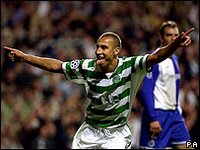
When is a two-horse race not a two-horse race? When it's a one-horse race.
Ask anyone on this dirty old planet who has even the most fleeting acquaintance with football matters about the SPL, and your reply will, in every case, include the words "Celtic" and "Rangers", and perhaps also "Mickey" and "Mouse".
But while, in broad historical terms, the notion of the two-team cartel is reinforced by the record books, the last couple of decades have seen, in general, monopoly rather than duopoly.
From the late 1980s until the late 1990s, Rangers utterly dominated Scottish football, their eminence powered by the liberal chequebook of owner and chairman David Murray. Celtic, along with all other rivals, were cowed into distant inferiority by the Ibrox club's financial clout.
Then, as Murray's efforts to extend his team's success to the European theatre petered out with the dwindling of his financial largesse, the club now known as Celtic plc found the on-field general to match footballing success to their stronger financial situation, when Martin O'Neill became manager in the summer of 2000.
The title count in the years since has been 5-2 in Celtic's favour, with the two Rangers successes being nailbiting, last day finishes; the first while their rivals were distracted by a UEFA Cup campaign that saw them reach the final, the second in O'Neill's final days as manager, when his aging team threw the title away in the dying moments of their final game against Motherwell.
Celtic's triumphs, on the other hand, have been by 15, 18, 17, 17 (from Hearts in second in 2005-06) and 12 points respectively, and in each of those seasons the champions were 'pulling up' before the finish, foregoing meaningless points that would have meant even bigger margins of victory, often in favour of experimentation with young players.
So, will the 2007-08 season, which starts on Saturday with Rangers' lunchtime visit to Inverness (Celtic unfurl the league flag against Kilmarnock on Sunday afternoon), see the SPL return to close combat between the Glasgow big two, or will Celtic's domination continue with another canter to the title?
In purely financial terms, the Parkhead club look to be operating with much superior weaponry than their old enemy. Celtic outbid Rangers for the signing of Scott Brown, the £4.4 million Gordon Strachan's side paid being far in excess of the fee Rangers by which had hoped to secure the highly rated youngster.
Scott McDonald arrived at Celtic from Motherwell after also being a target for Rangers, joining Chris Killen, the New Zealander recruited from Hibs. Massimo Donati's signature from AC Milan has thus far concluded Strachan's summer business, although many expect further movement in the remaining month of the summer transfer window, with full-backs especially seen as a priority.
Rangers have also been extremely active, even if Walter Smith's budget has not matched those he enjoyed in his first spell as manager. The new men may not be of the calibre of Brian Laudrup and Paul Gascoigne, but the likes of Carlos Cuellar (£2.4 million from Osasuna), Lee McCulloch (£2.25 million from Wigan Athletic), Stephen Whittaker (£2 million from Hibs), as well as free transfers DaMarcus Beasley (PSV Eindhoven), Jean Claude Darcheville (Bordeaux) and Roy Carroll (West Ham) demonstrate that, at the very least, the Ibrox faithful will have the novelty of new faces to enjoy.
Most observer expect Rangers' challenge to be immeasurably more competitive this season. Walter Smith's return inspired a retrieval of self-respect from the second half of a season which had brought only embarassment and internal strife under the stewardship of Paul Le Guen.
Smith's wealth of experience and keen understanding of the Scottish game should ensure Rangers will be a stronger force at home this season, even if the manager's record in Europe during his first period in charge does little to promise a badly-needed, revenue-generating Champions League run.
As far the rest, the hope inspired by Vladimir Romanov's initial arrival in Scottish football that Hearts might become a genuine third force has long been dissipated in a firestorm of managerial rows, player revolts and peculiar transfer dealings. Aberdeen, third last season, will be happy to repeat the feat having lost captain Russell Anderson to Sunderland, while Hibs have been victims of their own successful youth policy, Brown and Whittaker joining the long list of Easter Road talent who have left for bigger things.
This season, it seems, those running Scottish football would be perfectly happy to have the much maligned two-horse race back in place, rather than the procession it often, actually, is.
Labels: celtic, football, rangers, spl
 2-0, and as Shakhtar Donetsk manager Mircea Lucescu said, it could have been six. Everyone knows the statistic: fourteen Champions League away trips, no wins, just the one draw.
2-0, and as Shakhtar Donetsk manager Mircea Lucescu said, it could have been six. Everyone knows the statistic: fourteen Champions League away trips, no wins, just the one draw.













